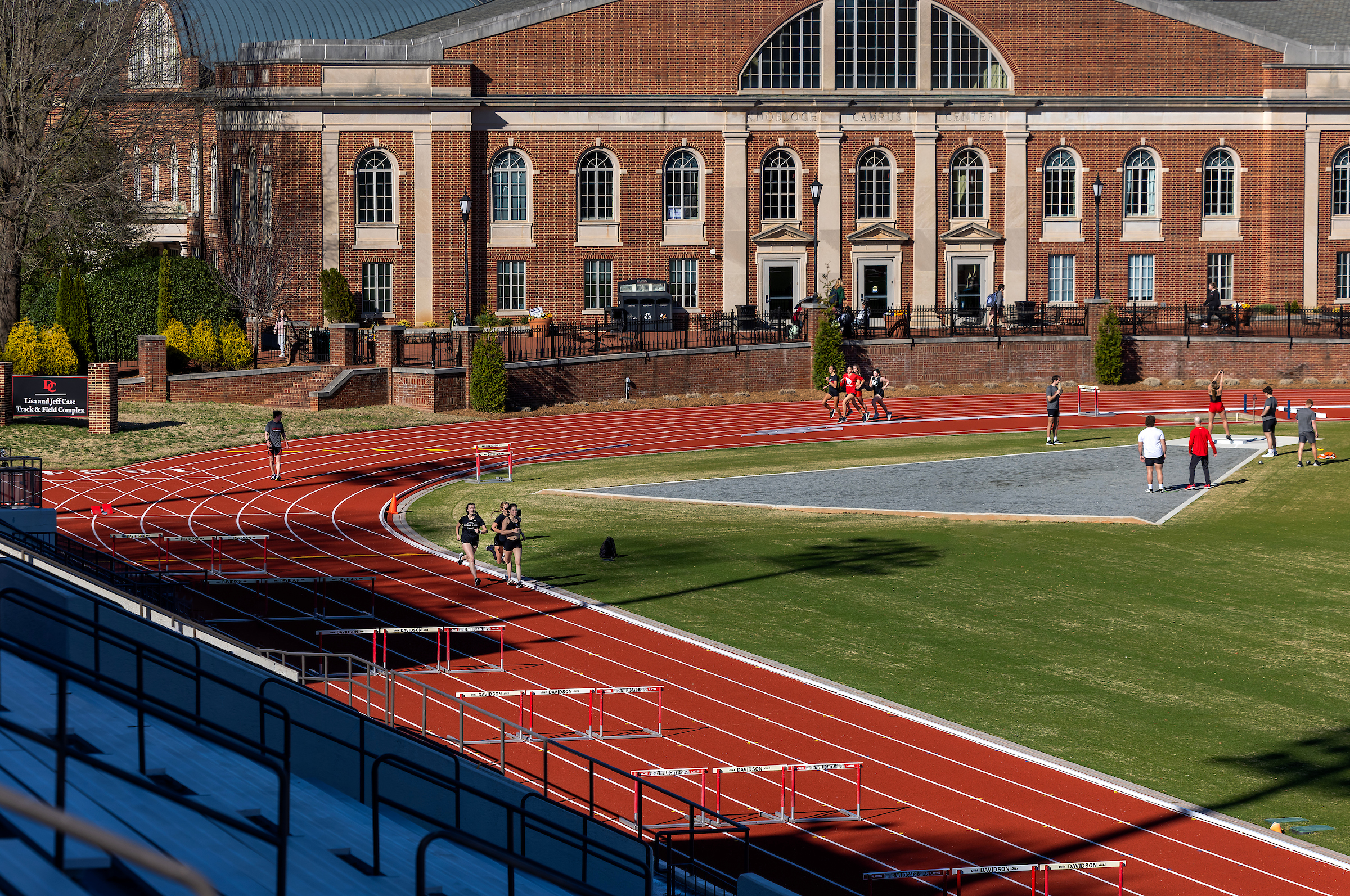Seeking Answers and Cures: Davidson College Receives New Carnegie Research Designation
February 13, 2025
- Author
- Mary Elizabeth DeAngelis
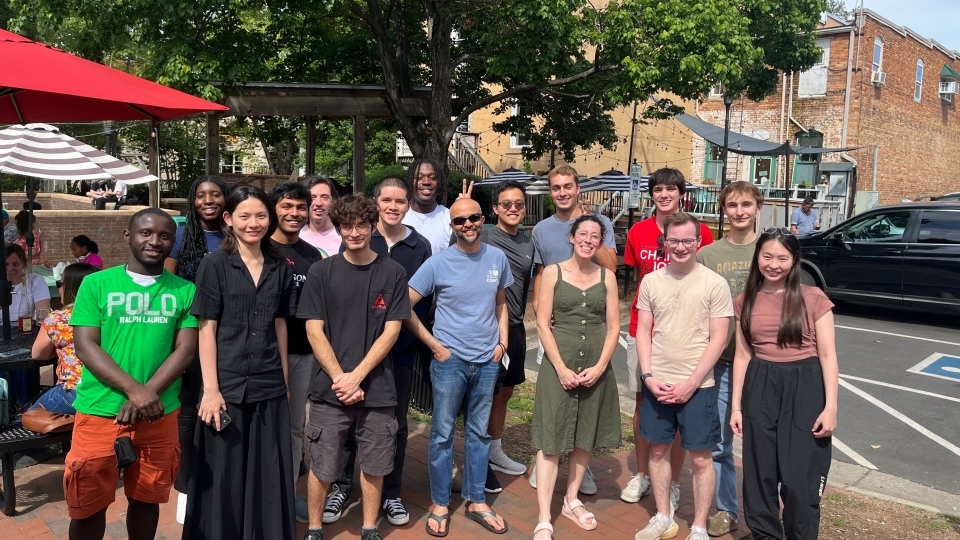
Associate Professors and ALPhA co-founders Michelle Kuchera and Raghu Ramanujan with their student researchers.
Ben Votaw came to Davidson College with little formal research experience; he’ll graduate in May with more than a thousand hours’ worth, and an advanced understanding of the atomic forces powering everything from stars in the sky to medical devices in hospitals.
Senior Izzie Meyers has spent her four Davidson years studying T cell development, alternating between classrooms and laboratories seeking clues that could help patients fighting cancer and other diseases regenerate those T cells to build immunity.
And Kenan Wood, also a senior, has clocked in countless hours working on the mathematical and computer science puzzles that help build cybersecurity in sensitive areas such as financial transactions and voting systems.
The three are among dozens of Davidson students whose research, rivaling graduate work at large universities and often funded by external grants, propelled the small liberal arts college into a new classification of research institutions announced today.
The Carnegie Foundation is including Davidson and a select group of other schools in a new category: Research Colleges and Universities. That places the college just below the familiar R1 and R2 groups of research universities.
Davidson’s new designation is driven by the college’s commitment to these types of research ventures, the close collaborations between students and professors, and success in securing funding sources, from small stipends to big grants. The new Carnegie Classification recognizes that important research doesn’t only occur in big institutions that award post-graduate degrees.
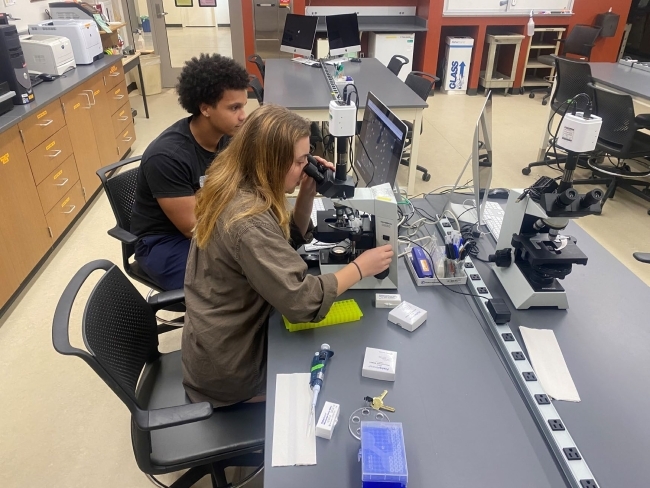
During their 4-week RISE internship, Nadia Nowicki ‘26 and Dag Asres ‘26 generated a collection of 400 S. cerevisiae (brewer’s yeast) mutants.
“Every sector of higher education has a vital role to play in the advancement and application of knowledge,” Ashley Finley, vice-president of research for the American Association of Colleges & Universities, said. “Davidson’s recognition in the new cohort of Carnegie Research Colleges and Universities is a recognition that dedication to high quality teaching does not come at the expense of deep, meaningful research.
“The existence of both can, and should, define institutional excellence.”
The new designation applies to institutions that average at least $2.5 million per year on research and aren’t in a larger R1 or R2 classification. Some 218 institutions, less than 1% of the nation’s colleges and universities, fall into the new RCU category.
The classifications are an important benchmark of the level of work being performed, a helpful guide for researchers, policymakers and the public, as well as foundations and government agencies that fund projects. The news comes, though, at an anxious and uncertain time for research in higher education, as colleges and universities — and even Congress — try to sort out executive orders in Washington that could jeopardize critical federal funding, including for medical research. Davidson currently has about $5 million in federal research grants, and college leaders have joined other institutions in urging lawmakers to support higher education funding.
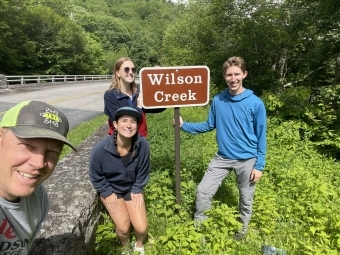
Through funding from the U.S. Geological Survey (USGS) National Cooperative Geological Mapping Program, Prof. Brad Johnson and students are producing a geologic map of the Wilson Creek area to better understand the landscapes of the Blue Ridge Escarpment.

Evie Mulhern '25 prints wallpaper for Professor Joelle Dietrick’s project about extinct plants and sustainable homes.
Causes and Cures
Davidson students and faculty conduct research ranging from tracking natural disaster erosion patterns to studying brain markers of Alzheimer’s disease to seeking ways to improve K-12 education.
Some students present their research at national and international conferences and publish papers for academic and industry journals. That includes Meyers and Wood, who have also received prestigious awards like the Goldwater Scholarship. Wood was recently named a Churchill Scholar.
“I absolutely love doing research at Davidson,” Meyers said. “Working in Dr. (Sophia) Sarafova’s lab provided me with a huge set of skills that go beyond just research. Not only did I learn research techniques, but also critical analysis and presentation skills as well.”
Her research was recently published in an article in Frontiers in Immunology. After graduation, she plans to obtain a master’s degree focused on diabetes or immunology, and then, go on to an M.D./doctoral program.
“I’ve presented my work to a myriad of audiences, from undergraduate and graduate students to experts in the field of T cell development and immunology,” Meyers said. “Due to my Davidson experiences, I was accepted into a summer research program in my hometown of Pittsburgh, where I continue to work over the summers.”
In that work, at the Rangos Research Center at the University of Pittsburgh Medical Center Children’s Hospital, she studies cell tissue samples in a search toward a cure for Type 1 diabetes — an autoimmune disorder where the human body stops producing insulin — that afflicts her younger brothers and so many others.
High Tech Opportunities
Votaw, a physics major with a minor in data science, was a part of the Algorithms for Learning in Physics Applications (ALPhA) research group at Davidson in the summers of 2023 and 2024. The group uses AI to advance understanding of the atomic nucleus and other particles.
They develop machine learning models to categorize different reactions, as he explains for non-physicists, “just like you can train a computer to tell the difference between a dog and a cat.”
ALPhA researchers have collaborated with physicists from around the world at the Facility for Rare Isotope Beams (FRIB), the Thomas Jefferson National Accelerator Facility and CERN — the European Organization for Nuclear Research.
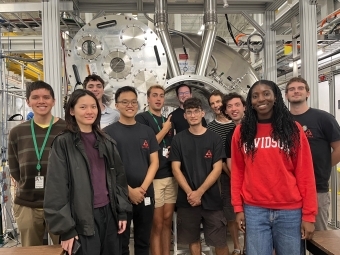

Applications of ALPhA research span multiple topics, from studying nuclear reactions in stars to investigating potential medical treatments and diagnostic methods using isotopes.
“We’re a small cog in the machine but we’re building models and contributing data that’s also helping other researchers,” Votaw said. “What I discovered most is that research is incredibly collaborative, and no contribution is insignificant.”
In late 2023, he and his research partner Andrew Jones, also a senior, were among several Davidson students presenting their work at the American Physical Society Division of Nuclear Physics and the Physical Society of Japan’s joint meeting and conference in Hawaii. They had created a machine learning model designed to identify and categorize nuclear reactions.
Such conferences give researchers at all levels — undergraduates though senior scientists — the chance to connect and learn about the work being done in the field at research facilities around the world.
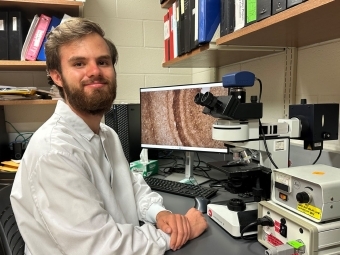
Ethan Maddox '25 examining hippocampal sprouting response with BioQuant Image Analysis system.

Dr. Karen Bernd, Nadia Nowicki ’26, Addy Donaldson ‘25, James Noh ‘24, and Dag Asres ‘26
“Even though I was just an undergraduate researcher, they took great interest in the work I was doing and how it could potentially help their research/experimental analysis,” Votaw said.
Associate Professors Michelle Kuchera and Raghu Ramanujan co-founded and run the ALPhA program. Its mission is to give students opportunities “to make impactful contributions to national research efforts in AI for nuclear and particle physics.” They currently have a three-year, $600,000 grant from the National Science Foundation to continue and expand the program.
Nearly half of 28 Davidson graduates who were involved in ALPhA have gone on to post-graduate STEM programs, while others went straight into technical careers. Both professors have also had students who haven’t gone into STEM careers but credit their research with helping them in other fields.
“Research is for everyone who has a genuine curiosity, tenacity and a willingness to go after a problem, even when it doesn’t pan out,” Ramanujan said. “It develops meta-cognitive skills; it helps communications skills when students write and present their work. It helps them learn to cope with ambiguity. These are all things you’re going to need in whatever career you go into.”
And it’s not only students learning.
“They’re teaching us,” Kuchera said. “I’m always learning from our student researchers. I value the research we do, and it means a lot that the college values our work.”


